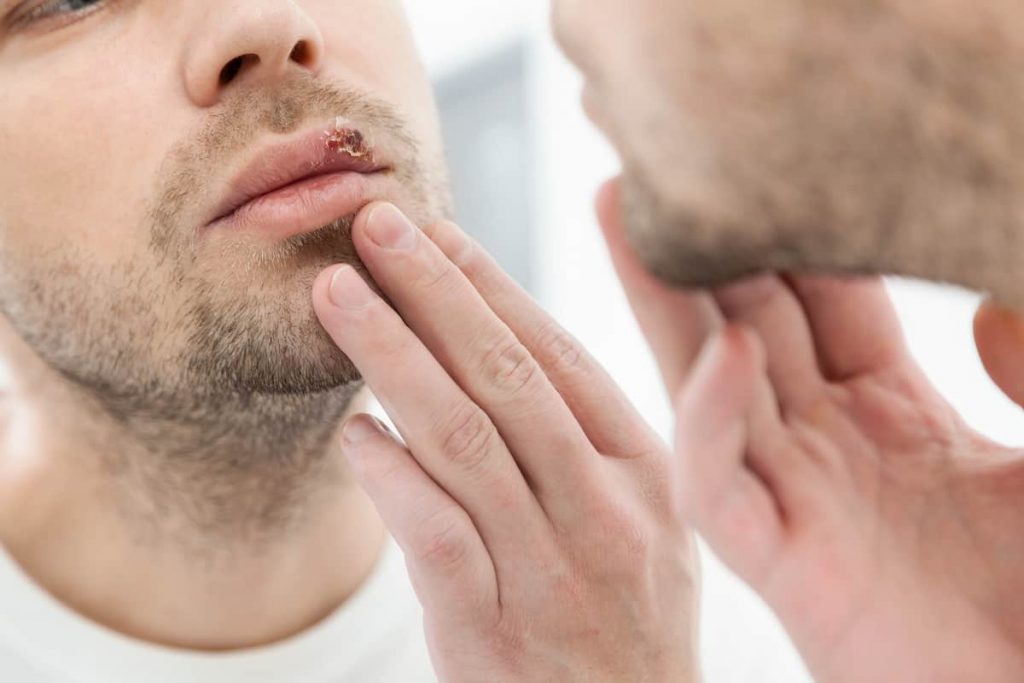
You may be wondering how common is herpes in the UK?
If you are reading this post, it is likely that you have heard of herpes or know someone who has contracted the virus.
What is Herpes?
There are two types of HSV. The first type, HSV1, causes cold sores on or around your mouth, whereas HSV2 can cause genital sores if transmitted to a partner’s genitals during sexual contact.
According to WHO statistics, about one in four people aged 16-49 years old have genital herpes, but many will not experience any symptoms, so they won’t know they’re infected unless they take an STD test. [1]
It is a common skin condition caused by the herpes simplex virus. It’s caused by two different types of viruses, both of which are highly contagious. The most common symptom of the infection is an outbreak of blisters or sores on or near the infected site. [2]
Other symptoms include fever, headache, swollen lymph nodes, muscle aches, and general malaise. Sometimes there are no obvious symptoms at all. There are two types of Herpes: oral and genital. It’s possible to catch them from someone who has either form of HSV, even if they don’t have any symptoms or sores.
The two types are:
Type 1 (HSV-1) usually causes sores in and around the mouth and lips (known as ‘cold sores’). However, it can spread to another part of the body during a sexual encounter.
Type 2 (HSV-2) usually causes sores in and around the genitals or anus, but it can spread to another part of the body during a sexual encounter. HSV-1 is very uncommon in genital herpes infections.
Symptoms of Herpes
The symptoms can vary dramatically from person to person and will depend on the person’s age and immune system. The first time someone has an outbreak, they may experience severe symptoms such as severe muscle aches, fever, headache, and sore throat among other things.

This is known as a primary infection. If someone does not have a primary infection and experiences their first herpes outbreak during adulthood, it is unlikely for them to have severe symptoms. The first outbreak may only last for a few days or weeks before disappearing.
However, some people do not notice any symptoms during their first herpes outbreak, whereas others might experience very mild symptoms about four days after exposure to the virus.
The symptoms of this virus include:
- Painful, fluid-filled sores
- Fever or chills
- Vaginal discharge in women or penile discharge in men

How common is herpes in the UK?
You might have the virus and not even know it! Genital HSV is one of the most common sexually transmitted infections (STIs), with up to 23% or 36 million adults in UK and US having antibodies to HSV-2. In England, there were 30658 cases diagnosed at sexual health clinics last year alone! [3]
Though there are few symptoms, it can be transmitted to another person by coming into contact or sharing items that have been touched by someone with the infection. People who are particularly vulnerable to the infection include those with weak immune systems, such as cancer patients and transplant recipients.
Oral HSV is usually caused by HSV-1 and most commonly results in cold sores on the mouth. For this reason, it’s sometimes called “cold sores”. [4]
A type of HSV-2 always causes genital herpes. In most cases, it’s spread by having sex with someone who already has genital herpes.
The prevalence of HSV-1 in the UK is probably much higher, but it is difficult to determine an exact figure because so many people have been exposed to HSV-1 when they were children. However, the average age that people are diagnosed with genital herpes in the UK is 29 years old, which indicates how common it is, as well as the fact that people may not know they have it.
Many people with HSV-2 infection don’t realize they’re infected and aren’t aware that they can infect others. This is why there are such large numbers of people diagnosed with genital herpes in the UK each year.
Can I get rid of HSV?
Doctors can only offer treatments that manage the symptoms and enable them to be less infectious. Currently, the treatments are antiviral tablets. [5] They can’t cure it, but they can help reduce pain and discomfort and lower the number of outbreaks.
If you’re diagnosed with herpes, talk to your doctor about getting a prescription for antiviral medication.
They may prescribe aciclovir tablets or aciclovir cream. These Herpes medications can:
- reduce the severity and number of herpes outbreaks
- shorten an outbreak
- help your body fight off the virus
Aciclovir, famciclovir, and valacyclovir (which is similar to aciclovir) are available in tablet forms. Your doctor may recommend taking the medication at the first sign of an outbreak (such as tingling, burning or pain) and continuing taking them for several days.

It cannot be cured, but antiviral medications can help reduce the symptoms and shorten outbreaks. Antiviral medications are taken orally on a long-term basis to prevent outbreaks.
They are generally taken at the first sign of tingling to help prevent an outbreak. Here’s some advice that can help you take care of yourself:
- avoid sex during outbreaks
- use condoms or other protection if you have sex during non-outbreak times
- talk to your doctor about taking antiviral medication daily in order to reduce outbreaks
Conclusion
It is important to know the difference between HSV-1 and HSV-2. If you are infected with herpes, it doesn’t necessarily mean that your partner will also become infected. Still, if they do not already have natural immunity, there’s no way of telling.
There are many ways to get rid of HSV, including medication like aciclovir tablets or aciclovir cream, which can reduce symptoms by reducing the viral load in your body. You should talk to your doctor about what options may be best for you because everyone is different!
Sources
- Herpes Simplex Virus Key Facts | WHO (World Health Organization)
- Herpes Simplex Overview | Healthline
- How common is herpes simplex? | NICE
- Cause of Cold Cores | Healthline
- Antiviral Drugs for Viruses Other Than Human Immunodeficiency Virus | NCBI
Further Reading
Genital Herpes | NHS
Herpes Simplex Virus: HSV-1 & HSV-2 | WebMD
Herpes Simplex | Healthline








